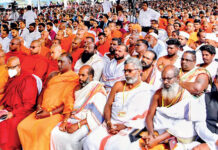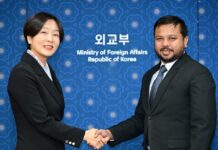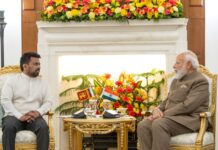A joint report evaluating Sri Lanka’s recent political and human rights developments has been submitted to the United Nations Human Rights Council (UNHRC) by the Sri Lanka Core Group, led by the United Kingdom.
The report was presented on Monday (March 3) during the 58th session of the UNHRC, with contributions from Canada, Malawi, Montenegro, and North Macedonia.
The Core Group Commended Sri Lanka’s peaceful elections and smooth transition of power last year while reviewing the actions of the current government.
“We recognise that the new Sri Lankan Government has only been in place for four months, and we encourage Sri Lanka to use the opportunity that this transition represents to address the challenges it faces,” the report stated.
It also acknowledged initial steps taken towards reconciliation, including the return of land, lifting of roadblocks, and allowing communities in the North and East to commemorate past events and memorialise loved ones.
Additionally, the report welcomed commitments to implement devolution in accordance with the constitution and advance governance reforms.
The Core Group took note of the Sri Lankan government’s stated intention to replace the Prevention of Terrorism Act (PTA) and emphasised that any new legislation must align with Sri Lanka’s international obligations.
“We encourage the release of those who remain detained under the Act,” the report urged.
Call for Meaningful Reconciliation and Justice
The report further encouraged the government to ensure that any reconciliation and accountability process is inclusive, meets international standards, and has the support of affected communities.
“We also encourage the Government to re-invigorate the work of domestic institutions focused on reparations and missing persons,” the Core Group noted.
It reaffirmed its willingness to collaborate with Sri Lanka in establishing independent, meaningful transitional justice mechanisms that meet the expectations of affected communities.
Sri Lankan Government’s Response
Meanwhile, the Sri Lankan government presented its own oral report to the UNHRC in Geneva on the same day.
The government’s report outlined ongoing initiatives to foster a new political culture, economic progress, and social development in Sri Lanka. It reaffirmed the country’s commitment to democracy and human rights while rejecting UNHRC Resolutions 46/1, 51/1, and 57/1, as well as the external evidence-gathering mechanism on Sri Lanka.
With the UNHRC’s session ongoing, discussions on Sri Lanka’s human rights and governance progress are expected to continue in the coming days.



